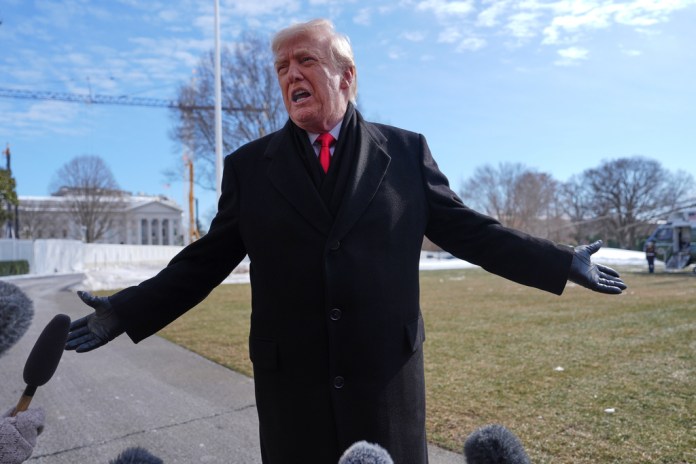Under New Trump EO, Every American Is No Longer A Felon
on May 9, 2025, President Donald trump signed an executive order called “Fighting Overcriminalization in Federal Regulations” aimed at curtailing the excessive expansion of criminal penalties in U.S. regulations. This order addresses the growing problem of vague and numerous federal crimes that threaten individual liberties by creating a legal environment where ordinary citizens can inadvertently become criminals. The executive order introduces two main reforms: it restricts criminal enforcement to cases involving knowing violations of regulations and requires federal agencies to publicly disclose all regulations with criminal penalties, including the mental state needed for conviction.
Historically,congress held the sole authority to define a limited number of clear federal crimes,focused on important threats. Today, there are potentially hundreds of thousands of federal crimes hidden within an extensive regulatory framework, leading to a situation where nearly every adult can unknowingly commit a violation. This environment fosters selective enforcement by prosecutors and creates a sense of fear among citizens, akin to a system of tyranny.
Civil liberties advocates support Trump’s initiative as a necessary correction to a system that undermines fundamental justice principles. The order has garnered bipartisan concern in Congress about overcriminalization and the erosion of due process. Critics may question Trump’s motivations, but many agree that criminal law should focus on intentional wrongdoing rather than penalizing unintentional regulatory mistakes. The order seeks to re-establish transparency and accountability in criminal enforcement as essential components of democratic governance.
On May 9, 2025, President Donald Trump signed an executive order titled “Fighting Overcriminalization in Federal Regulations,” addressing one of the most insidious threats to American liberty: the unchecked expansion of criminal penalties through regulatory sprawl. For decades, this trend has eroded the separation of powers, undermined due process, and transformed the federal legal system into a maze where ordinary Americans risk criminal liability for unknowable infractions.
While largely ignored by the corporate press, civil liberties advocates should see this order as a long-overdue corrective. It tackles the explosion of hidden criminal penalties, reaffirms the necessity of criminal intent, and forces long-overdue accountability onto the administrative state.
The order accomplishes two key reforms. First, it limits criminal enforcement to cases in which a person knowingly violates a regulation, discouraging the use of “strict liability,” which bypasses the traditional requirement of criminal intent. Second, it compels federal agencies to publicly identify every regulation they enforce with criminal penalties, along with the statutory authority and mental state required for conviction. That such basic transparency has never been required is an indictment of how far the system has drifted from constitutional norms.
To appreciate how far we’ve strayed, consider the founding era. Originally, Congress held exclusive authority to define federal crimes, and those crimes were few in number, targeting only existential threats to the republic, such as treason, piracy, and counterfeiting. These laws were clear, deliberate, and rooted in the principle that punishment required both wrongful conduct and a guilty mind.
Today, by contrast, legal scholars cannot even agree on how many federal crimes exist. The Code of Federal Regulations spans more than 175,000 pages, burying countless criminal provisions deep within bureaucratic text. A 2022 algorithmic study estimated that the U.S. Code alone contains more than 5,000 federal crimes, and when regulatory offenses are included, the number may reach into the hundreds of thousands. As law professor Jonathan Turley recently testified before Congress, we may now need artificial intelligence just to identify all the crimes on the books. That is not hyperbole — it is a measure of how disconnected federal criminal law has become from the rule of law.
The result is a dystopia in which nearly every American adult is a potential felon. “There is no one in the United States over the age of 18 who cannot be indicted for some federal crime,” retired law professor John Baker once observed. “That is not an exaggeration.” If everything is a crime, everyone becomes a criminal, empowering prosecutors to target individuals first and search for crimes later. This selective enforcement invites abuse, especially when legal ambiguities intersect with political incentives.
The longstanding legal principle that “ignorance of the law is no excuse” only makes sense if the law is reasonably knowable. Everyone understands murder is wrong. But when it comes to regulatory offenses buried in obscure agency publications, fair notice disappears. As Justice Neil Gorsuch and legal scholar Janie Nitze recently wrote, the Roman emperor Caligula would post laws in tiny print and in inaccessible locations so no one could read them. “The whole point was to ensure that people lived in fear — the most powerful of a tyrant’s weapons.” America’s current regulatory state, with its thousands of hidden crimes, mirrors this tyranny of uncertainty.
Many of these crimes defy common sense. The A Crime a Day account on X and its companion book, How to Become a Federal Criminal, document the absurdities: It’s a federal crime to mail a mongoose or to leave the country with more than $5 in nickels or pennies. These aren’t just punchlines; real Americans have been prosecuted under similarly obscure statutes, often for conduct no reasonable person would recognize as criminal. Mislabeling imported goods, disturbing protected wildlife by accident, or violating esoteric shipping rules has led to life-altering penalties.
In principle, the criminal justice system is supposed to require mens rea, meaning “a guilty mind.” Strict liability, where no proof of intent is needed, might be defensible for minor infractions like parking tickets. But where liberty is at stake, intent matters. Prosecuting someone for conduct they didn’t know was illegal, and that no reasonable person would assume was criminal, violates our most basic notions of justice.
Trump’s executive order strikes a blow to this Kafkaesque regime. It mandates that federal agencies publish clear, accessible lists of all criminally enforceable regulations, identify the legal authority for each, and define the mental state required for conviction. This reasserts a fundamental truth: Criminal punishment should apply only to knowing wrongdoing, not bureaucratic mistakes or obscure technicalities.
Civil liberties advocate Harvey Silverglate, author of Three Felonies a Day, has long warned that the average American unknowingly commits multiple federal crimes daily. Though no supporter of Trump, Silverglate welcomed the order as a long-overdue corrective, quipping that “even a stopped clock is right twice a day.” He speculated that Trump’s own experience as a criminal defendant may have sharpened his awareness of prosecutorial abuse and regulatory overreach.
Skeptics may question Trump’s motives, but the order should be judged on its merits. At a House subcommittee hearing on May 7, 2025, lawmakers from both parties expressed alarm about overcriminalization — a rare sign of bipartisan agreement on a pressing constitutional issue.
Overcriminalization should never have become a partisan matter. Allowing unelected regulators to impose criminal penalties through opaque rulemaking directly threatens due process, individual liberty, and democratic accountability. Criminal law is not a tool for regulatory micromanagement. It is a solemn authority that must be exercised with restraint, transparency, and fidelity to the principles of a free republic.
Laura Powell is a civil liberties attorney and former public defender. She advocates for the protection of democratic norms and civil rights in California through her nonpartisan organization, Californians for Good Governance. Follow her on X: @LauraPowellEsq.
" Conservative News Daily does not always share or support the views and opinions expressed here; they are just those of the writer."



